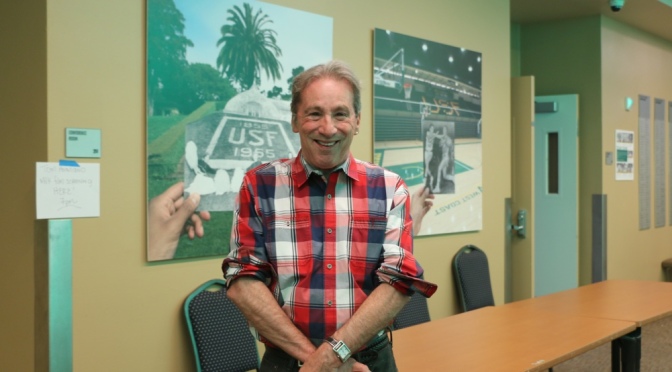Rafael JM Herrero
Contributing Writer
McLaren Conference Center fell silent last Friday night as the Academy Award winning documentary “The Times of Harvey Milk” started to roll. Tom Ammiano, a 72 year-old California politician and LGBT rights activist who worked personally with Harvey Milk, introduced the film and gave extensive commentary and answered questions afterwards.
The event was organized by USF’s MA program in Public Affairs. Angela Fleekop, the administrative director of the graduate programs at the McCarthy Center for Public Service, and, Rachel Brahinsky, the faculty director of Urban Affairs, were both present. Brahinsky said one of the objectives of the program is to help her students “learn how to take on the problems that face cities around the globe.”
In this movie released in 1984 and narrated by Harvey Fierstein (“Torch Song Trilogy,” “Kinky Boots”) ― not to be confused with the 2009 movie “Milk” with Sean Penn ― eight interviewees who worked closely with Harvey Milk tell us about the trials and tribulations that led to the brutal assassination of San Francisco Mayor George Moscone and Harvey Milk, a member of the San Francisco Board of Supervisors at that time, in their offices in City Hall. Tom Ammiano, the event’s host, was one of the interviewees on film. Ammiano, also a comedian who still offers one-man-shows, was a member of the California State Assembly between 2008 and 2014. At 72, with a lot of experience under his belt, he added, “Harvey was a difficult person to work with, and often lost his temper.” Ammiano was the first openly gay public school teacher in California and fought hand in hand with Milk against the Briggs Initiative (the petition by California State Senator John Briggs that aimed to ban gays and lesbians from teaching in public schools).
Harvey Milk was the first openly gay person to be elected to public office in California. He fought to change San Francisco’s voting process to a district-based system, he founded the Castro Street Fair, and he successfully battled against the Briggs Initiative (also called Prop 6). He equally sponsored a bill that outlawed discrimination based on sexual orientation (which Moscone enthusiastically signed into law), and he defended the rights of ethnic minorities and the handicapped with vigor.
The homophobic attitudes of many of the San Francisco communities of the time and the
political battles of City Hall greatly affected isolated supervisor Dan White. After learning that he would not be reappointed to the position he had abruptly resigned from, he put a gun and extra bullets in his pockets and climbed into City Hall through a window to avoid metal detectors. He shot George Moscone and Harvey Milk with several shots to their heads on November 27, 1978. A good-looking “all-American boy” judged by a jury exempt of gay or ethnic minority members, White was condemned to only seven years of prison at a time that allowed death or life in prison for the murder of a public official. This ignited five days of angry riots in San Francisco, famously known as “The White Night Riots.”
Ofelia Bello, a 22 year old first-year graduate student in Urban Affairs, attended the screening.“I wanted to learn about San Francisco. I grew up in the Bay Area, but I didn’t know something of this caliber could happen,” she said.
After only eleven months as an elected member of the SF Board of Supervisors, and dead at 48, Harvey Milk left a mark on history. Alarmed by death threats before his murder, Milk started recording his thoughts on tape. He said, “If a bullet should enter my brain, let that bullet destroy every closet door.”
Harvey Milk’s life was an example of transformation (from Republican to Democrat, from in-the-closet to gay activist), a lesson in tenacity and, according to Ammiano, a symbol of “self-affirmation.” Ammiano said, “I would like students to walk away from here with the certainty that, no matter who you are, you should stand up for your ideals. You should know that you have allies, you should know that you have a community.”
Ammiano ended the evening with a smile saying, “You can kill the messenger, but not kill the message.”
Photo courtesy of Racquel Gonzales/Foghorn

